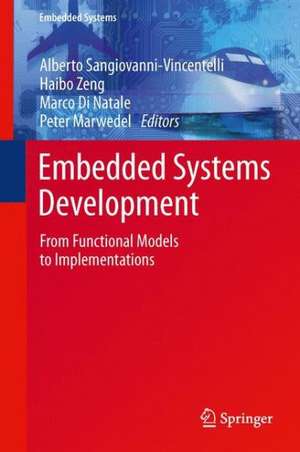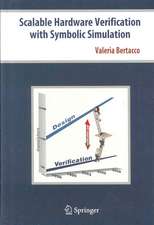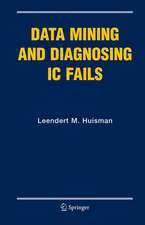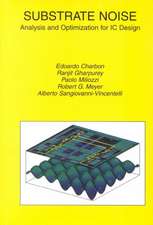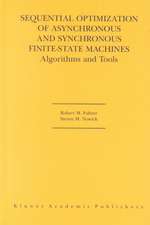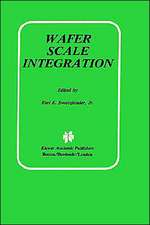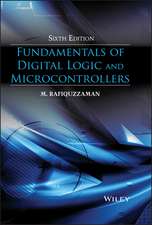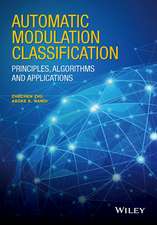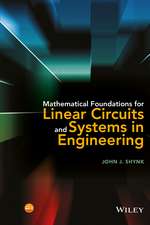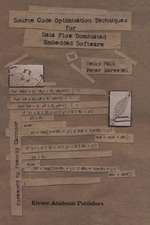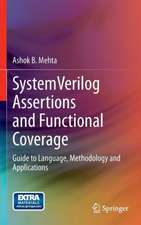Embedded Systems Development: From Functional Models to Implementations: Embedded Systems, cartea 20
Editat de Alberto Sangiovanni-Vincentelli, Haibo Zeng, Marco Di Natale, Peter Marwedelen Limba Engleză Hardback – 19 iul 2013
| Toate formatele și edițiile | Preț | Express |
|---|---|---|
| Paperback (1) | 693.71 lei 43-57 zile | |
| Springer – 6 aug 2015 | 693.71 lei 43-57 zile | |
| Hardback (1) | 641.71 lei 43-57 zile | |
| Springer – 19 iul 2013 | 641.71 lei 43-57 zile |
Din seria Embedded Systems
- 20%
 Preț: 312.03 lei
Preț: 312.03 lei - 20%
 Preț: 411.16 lei
Preț: 411.16 lei - 18%
 Preț: 950.66 lei
Preț: 950.66 lei - 15%
 Preț: 634.68 lei
Preț: 634.68 lei - 23%
 Preț: 456.63 lei
Preț: 456.63 lei - 15%
 Preț: 646.11 lei
Preț: 646.11 lei - 15%
 Preț: 697.65 lei
Preț: 697.65 lei - 18%
 Preț: 946.55 lei
Preț: 946.55 lei - 20%
 Preț: 532.91 lei
Preț: 532.91 lei - 15%
 Preț: 693.06 lei
Preț: 693.06 lei - 18%
 Preț: 783.81 lei
Preț: 783.81 lei - 18%
 Preț: 784.79 lei
Preț: 784.79 lei - 32%
 Preț: 303.94 lei
Preț: 303.94 lei - 20%
 Preț: 700.08 lei
Preț: 700.08 lei - 15%
 Preț: 643.48 lei
Preț: 643.48 lei - 18%
 Preț: 789.35 lei
Preț: 789.35 lei - 15%
 Preț: 585.27 lei
Preț: 585.27 lei -
 Preț: 387.75 lei
Preț: 387.75 lei - 24%
 Preț: 786.94 lei
Preț: 786.94 lei - 18%
 Preț: 833.09 lei
Preț: 833.09 lei - 15%
 Preț: 648.24 lei
Preț: 648.24 lei - 33%
 Preț: 988.97 lei
Preț: 988.97 lei - 18%
 Preț: 943.73 lei
Preț: 943.73 lei -
 Preț: 447.89 lei
Preț: 447.89 lei - 15%
 Preț: 641.71 lei
Preț: 641.71 lei - 15%
 Preț: 643.34 lei
Preț: 643.34 lei - 15%
 Preț: 640.06 lei
Preț: 640.06 lei
Preț: 641.71 lei
Preț vechi: 754.95 lei
-15% Nou
Puncte Express: 963
Preț estimativ în valută:
122.79€ • 128.55$ • 101.60£
122.79€ • 128.55$ • 101.60£
Carte tipărită la comandă
Livrare economică 07-21 aprilie
Preluare comenzi: 021 569.72.76
Specificații
ISBN-13: 9781461438786
ISBN-10: 1461438780
Pagini: 244
Ilustrații: VIII, 223 p.
Dimensiuni: 155 x 235 x 20 mm
Greutate: 0.45 kg
Ediția:2014
Editura: Springer
Colecția Springer
Seria Embedded Systems
Locul publicării:New York, NY, United States
ISBN-10: 1461438780
Pagini: 244
Ilustrații: VIII, 223 p.
Dimensiuni: 155 x 235 x 20 mm
Greutate: 0.45 kg
Ediția:2014
Editura: Springer
Colecția Springer
Seria Embedded Systems
Locul publicării:New York, NY, United States
Public țintă
Professional/practitionerCuprins
Introduction: Modeling, Analysis and Synthesis of Embedded Software and Systems.- Part I Model-Based Design and Synthesis.- Modeling, Analysis, and Implementation of Streaming Applications for Hardware Targets.- Dataflow-based, Cross-Platform Design Flow for DSP Applications.- Part II Model-Driven, Integration and Verification of Heterogeneous Models.- On Integrating EAST-ADL and UPPAAL for Embedded System Architecture Verification.- Schedulability Analysis at Early Design Stages with MARTE.- Part III Component-Based Design and Real-Time Components.- Early Time-Budgeting for Component-Based Embedded Control Systems.- Contract-Based Reasoning for Component systems with Rich Interactions.- Extracting End-to-end Timing Models from Component-Based Distributed Embedded Systems.- Part IV Timing Analysis and Time-Based Synthesis.- Distributed Priority Assignment in Real-Time Systems.- Exploration of Distributed Automotive Systems using Compositional Timing Analysis.- Design and Evaluation of Future Ethernet AVB-based ECU Networks.
Notă biografică
Alberto Sangiovanni Vincentelli, Fellow of the IEEE, member of NAE and the Buttner Chair of EECS, University of California, Berkeley, co-founded Cadence and Synopsys, the two largest EDA companies and is a member of the BOD of Cadence, Sonics, KPIT Cummins and Accent, of the Science and Technology Advisory Board of GM, and of the Technology Advisory Council of UTC, He received the Kaufman Award for “pioneering contributions to EDA” and the IEEE/RSE Maxwell Medal “for groundbreaking contributions that have had an exceptional impact on the development of electronics and electrical engineering or related fields”. He is an author of over 880 papers, 17 books and 3 patents.
Haibo Zeng received his Ph.D. in Electrical Engineering and Computer Sciences from University of California at Berkeley, a B.E. and M.E. in Electrical Engineering from Tsinghua University, Beijing, China. He was a senior researcher at General Motors R&D. He is currently an Assistant Professor at McGill University, Canada. His research interests are design methodology, analysis, and optimization for embedded systems, real-time systems, and cyber-physical systems.
Marco Di Natale is an IEEE Senior member and Associate Professor at the Scuola Superiore Sant’Anna, in which he held the position of Director of the Real-Time Systems (ReTiS) Lab from 2003 to 2006. He received his PhD from Scuola Superiore Sant’Anna in 1991. He was a visiting Researcher at the University of California, Berkeley in 2006 and 2008. In 2006 he was the national representative in the mirror group of the ARTEMIS European Union Technology platform. He's been a researcher in the area of real-time systems and embedded systems for more than 15 years, being author or co-author of more than 130 scientific papers. He has been winner of four best paper awards and one best presentation awards. He has served as Program Committee member and has been organizer of tutorials and special sessions for the mainconferences in the area, including the Real-time Systems Symposium, the IEEE/ACM Design Automation Conference (DAC), the Design Automation and Test in Europe (DATE) and the Real-Time Application Symposium in which he also served as Track Chair and Program Chair in 2012.
He has been associate editor for the IEEE Transactions on CAD and is currently in the editorial board of the IEEE Transactions on Industrial Informatics.
Dr. Peter Marwedel studied physics at the University of Kiel, Germany. He received his PhD in physics in 1974. As a post-doc, he published some of the first papers on high-level synthesis and retargetable compilation in the context of the MIMOLA hardware description language. In 1987, his habilitation thesis in computer science was accepted. Since 1989, he is holding a chair for computer engineering and embedded systems at the computer science department of TU Dortmund. He is also chairing ICD, a local spin-off of TU Dortmund. His research interests include design automation for embedded systems, in particular the generation of efficient embedded software. Focus is on energy efficiency and timing predictability. Dr. Marwedel published papers on energy-efficient software and compiler-supported use of scratchpad memories and he is the author of one of the few textbooks on embedded systems. Since 2011, he is the vice-chair of the collaborative research center SFB 876, aiming at resource-efficient analysis of large data sets. Dr. Marwedel is an IEEE Fellow and received the EDAA Lifetime Achievement Award in 2013.
Haibo Zeng received his Ph.D. in Electrical Engineering and Computer Sciences from University of California at Berkeley, a B.E. and M.E. in Electrical Engineering from Tsinghua University, Beijing, China. He was a senior researcher at General Motors R&D. He is currently an Assistant Professor at McGill University, Canada. His research interests are design methodology, analysis, and optimization for embedded systems, real-time systems, and cyber-physical systems.
Marco Di Natale is an IEEE Senior member and Associate Professor at the Scuola Superiore Sant’Anna, in which he held the position of Director of the Real-Time Systems (ReTiS) Lab from 2003 to 2006. He received his PhD from Scuola Superiore Sant’Anna in 1991. He was a visiting Researcher at the University of California, Berkeley in 2006 and 2008. In 2006 he was the national representative in the mirror group of the ARTEMIS European Union Technology platform. He's been a researcher in the area of real-time systems and embedded systems for more than 15 years, being author or co-author of more than 130 scientific papers. He has been winner of four best paper awards and one best presentation awards. He has served as Program Committee member and has been organizer of tutorials and special sessions for the mainconferences in the area, including the Real-time Systems Symposium, the IEEE/ACM Design Automation Conference (DAC), the Design Automation and Test in Europe (DATE) and the Real-Time Application Symposium in which he also served as Track Chair and Program Chair in 2012.
He has been associate editor for the IEEE Transactions on CAD and is currently in the editorial board of the IEEE Transactions on Industrial Informatics.
Dr. Peter Marwedel studied physics at the University of Kiel, Germany. He received his PhD in physics in 1974. As a post-doc, he published some of the first papers on high-level synthesis and retargetable compilation in the context of the MIMOLA hardware description language. In 1987, his habilitation thesis in computer science was accepted. Since 1989, he is holding a chair for computer engineering and embedded systems at the computer science department of TU Dortmund. He is also chairing ICD, a local spin-off of TU Dortmund. His research interests include design automation for embedded systems, in particular the generation of efficient embedded software. Focus is on energy efficiency and timing predictability. Dr. Marwedel published papers on energy-efficient software and compiler-supported use of scratchpad memories and he is the author of one of the few textbooks on embedded systems. Since 2011, he is the vice-chair of the collaborative research center SFB 876, aiming at resource-efficient analysis of large data sets. Dr. Marwedel is an IEEE Fellow and received the EDAA Lifetime Achievement Award in 2013.
Textul de pe ultima copertă
This book offers readers broad coverage of techniques to model, verify and validate the behavior and performance of complex distributed embedded systems. The authors attempt to bridge the gap between the three disciplines of model-based design, real-time analysis and model-driven development, for a better understanding of the ways in which new development flows can be constructed, going from system-level modeling to the correct and predictable generation of a distributed implementation, leveraging current and future research results.
- Describes integration of heterogeneous models;
- Discusses synthesis of task model implementations and code implementations;
- Compares model-based design vs. model-driven approaches;
- Explains how to enforce correctness by construction in the functional and time domains;
- Includes optimization techniques for control performance.
Caracteristici
Describes integration of heterogeneous models Discusses synthesis of task model implementations and code implementations Compares model-based design vs. model-driven approaches Explains how to enforce correctness by construction in the functional and time domains Includes optimization techniques for control performance Includes supplementary material: sn.pub/extras
